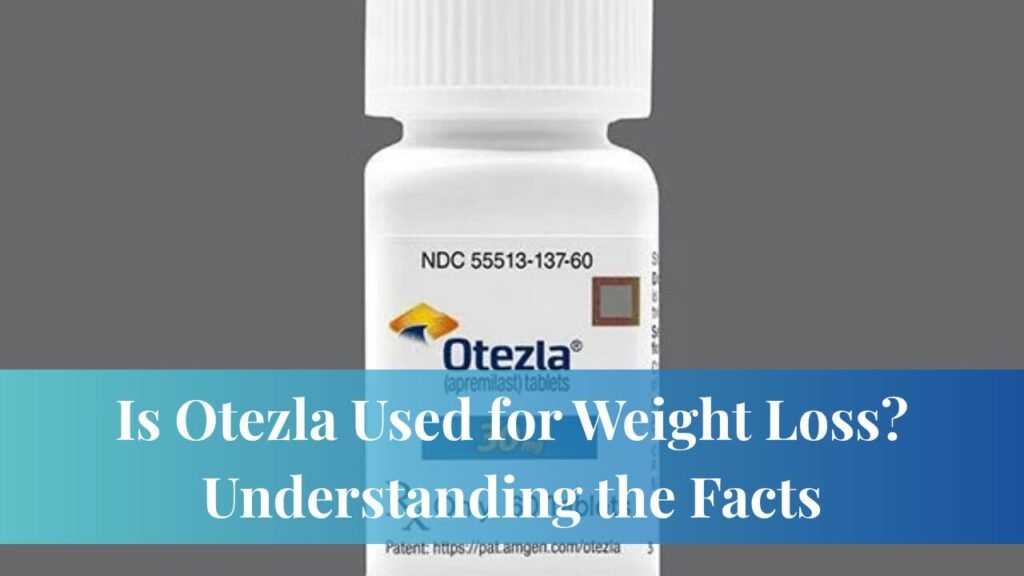Otezla is an oral medication classified as a phosphodiesterase 4 (PDE4) inhibitor. Its primary function is to regulate the body’s immune response by increasing levels of cyclic adenosine monophosphate (cAMP). This increase helps reduce the production of inflammatory cytokines such as TNF-α, IL-17, and IL-23. These cytokines play a major role in autoimmune and inflammatory diseases, and by suppressing them, Otezla helps ease symptoms associated with these conditions.
Currently, Otezla is approved by the U.S. Food and Drug Administration (FDA) for three specific indications: moderate to severe plaque psoriasis in adults, active psoriatic arthritis, and oral ulcers related to Behçet’s disease. It is taken orally, with most patients following a titration schedule that gradually increases the dosage to a maintenance dose of 30 mg twice daily. While it is effective for these medical purposes, it is not approved for, nor should it be used as, a treatment for weight loss.
How Weight Changes Occur with Otezla
Some patients using Otezla have reported unintentional weight loss as a side effect. Clinical trials have shown that approximately 10 to 12 percent of users experienced a weight loss of at least 5 percent from their baseline body weight. For example, a person weighing 180 pounds might lose around 9 pounds during treatment. On the other hand, a smaller proportion of users, about 3 percent, reported weight gain.
The exact reasons behind this weight change are not fully understood, but several potential mechanisms are suggested. Patients have reported experiencing nausea, diarrhea, or appetite suppression, all of which can lead to reduced food intake. Others mention early satiety or metabolic changes that may shift how the body processes and stores energy. These effects are considered incidental and are not part of Otezla’s intended therapeutic action.
Clinical Trial Data and Regulatory Perspective
Findings from key clinical trials, including the ESTEEM and RELIEF studies, confirm the potential for weight loss among Otezla users. In these trials, around 10 to 12 percent of participants experienced notable weight reduction within the first 12 to 16 weeks of therapy. The weight loss often stabilized after this period. Interestingly, individuals with lower baseline body mass index (BMI) seemed more susceptible to this effect, though not all experienced it.
Regulatory documents, including the official prescribing information approved by the FDA, list “weight decrease” as a known adverse reaction. Healthcare providers are advised to monitor patients’ weight during treatment. Significant or sustained weight loss could indicate gastrointestinal side effects or problems with nutrient absorption, prompting a need for evaluation or adjustment of the therapy.
So, Is Otezla Used for Weight Loss?
Despite some anecdotal experiences and clinical data pointing to weight loss, Otezla is not and should not be used as a weight loss medication. Using it for that purpose would be considered off-label and not supported by scientific evidence. Approved medications for weight management, such as GLP-1 receptor agonists like Wegovy or Ozempic, have been rigorously tested for safety and effectiveness in weight reduction. Otezla has not undergone such evaluations.
There are notable risks when using Otezla for unintended purposes. Patients may experience gastrointestinal distress, nutritional deficiencies, dehydration, or even psychological side effects such as mood disturbances. Since there is no established dosing or clinical guidance for using Otezla to manage weight, the practice would be medically inappropriate and potentially harmful.
Real-World Patient Experiences
Many patients have shared their personal experiences with Otezla on health forums and online platforms. Some reported losing between 10 and 15 pounds over the course of a few months, often attributing this to nausea or appetite suppression. Others saw only minimal weight changes, while a few noticed no difference at all. These stories highlight the variability in individual responses and underscore the need for personalized monitoring.
Healthcare professionals, particularly dermatologists and rheumatologists, are aware of the potential for weight fluctuations. When they observe significant weight loss, especially in patients who are already lean, they may recommend modifying the dosage, taking breaks, or switching to alternative treatments. This approach helps balance disease control with overall health and nutritional well-being.
Weighing the Benefits and Potential Harms
Otezla offers several benefits in its approved therapeutic areas. It is taken orally, eliminating the need for injections. It effectively reduces inflammation and improves symptoms in patients with psoriasis and psoriatic arthritis. Many patients tolerate the drug well, and it typically does not require ongoing laboratory monitoring, which adds convenience.
However, the impact on weight, though unintentional, is a downside for some. Appetite changes and gastrointestinal discomfort may lead to nutritional imbalances or dehydration. Unexpected weight loss can also cause stress or concern, particularly when it affects energy levels, appearance, or self-esteem. These effects must be carefully balanced against the drug’s therapeutic benefits.
Risk-Benefit Profile
For patients seeking relief from chronic inflammatory conditions, the advantages of Otezla often outweigh the drawbacks. However, for those considering it solely for weight loss, the risks far exceed any potential benefit. The drug was not designed or studied for this use, and taking it for weight-related purposes is not only ineffective but potentially dangerous. Patients are strongly advised to pursue medically approved options for weight management and to consult their healthcare providers before making decisions based on anecdotal evidence.
FAQs
Is Otezla Used for Weight Loss by Doctors?
No. Dermatologists and rheumatologists prescribe Otezla for inflammation-related conditions, not for weight loss. Any observed weight change is incidental.
How Much Weight Do People Usually Lose?
About 10–12 percent of patients lose 5 to 10 percent of their weight. However, individuals vary widely, and most users do not experience significant changes.
Can Weight Loss Be a Reason to Stop the Medication?
Potentially. If weight loss exceeds 5–10 percent and leads to symptoms such as weakness, fatigue, or dehydration, doctors may recommend dosage adjustment, temporary pause, or switch to an alternative therapy.
How Should I Monitor My Weight on Otezla?
Weigh yourself at least once weekly
Keep a log to detect patterns
Report decreases greater than 5 percent or nutrition issues promptly
Are There Alternatives That Don’t Affect Weight?
Yes. Many biologic drugs (e.g., Humira, Stelara, Cosentyx) and topical agents manage psoriasis without affecting appetite or weight
Monitoring Weight While on Otezla A Proactive Guide
Before starting Otezla, patients are advised to obtain baseline health measurements, including weight, body mass index (BMI), muscle mass, and hydration status. A discussion with a healthcare provider about previous weight trends and overall nutrition can help anticipate and manage potential side effects. Consulting with a dietitian may also be beneficial for those with existing nutritional concerns.
During treatment, patients should track their weight regularly ideally once a week and make note of symptoms like nausea, reduced appetite, or changes in bowel habits. Maintaining proper fluid intake is essential, especially if gastrointestinal side effects emerge. If a patient loses more than 5 percent of their body weight over 8 to 12 weeks, or experiences symptoms like fatigue, dehydration, or persistent appetite loss, it’s important to consult a healthcare provider immediately.
Comparing Otezla to Weight-Targeted Medications
Unlike GLP-1 receptor agonists such as Wegovy or Ozempic, which are designed and approved for weight loss and diabetes control, Otezla’s primary action is the modulation of inflammation. GLP-1 drugs actively regulate appetite and glucose metabolism, with their side effects closely monitored and dose-adjusted based on weight goals. In contrast, any weight changes seen with Otezla are unintended and not dose-specific.
Other weight-loss medications, including Orlistat, Contrave, and Saxenda, work by either blocking fat absorption or affecting appetite-regulating centers in the brain. These drugs are developed and approved with weight targets in mind. Otezla, however, has an unpredictable impact on weight and is not optimized for such outcomes, making it an unsuitable option for individuals pursuing weight loss therapies.
Ensuring Quality and Trustworthiness
This article draws from credible and authoritative sources, including FDA prescribing information, well-respected medical platforms such as Healthline and Drugs.com, and data from large-scale clinical trials like the ESTEEM studies. These sources confirm weight loss as a recognized but unintended side effect of Otezla. In addition, insights from medical professionals and patient feedback further support the findings shared in this overview.
The content presented here aligns with current dermatology and rheumatology best practices. It reflects information from official regulatory documents and incorporates real-world experiences, making it a comprehensive and reliable guide for patients and healthcare providers evaluating the risks and benefits of Otezla.
Conclusion
Otezla is not designed or approved for weight loss. Any reduction in body weight observed during treatment is an unintended and potentially concerning side effect. While some patients may welcome a modest drop in weight, this should be monitored carefully to ensure overall health is maintained. For those seeking weight management options, alternative treatments with proven efficacy and safety profiles are available. Always consult a healthcare provider for personalized advice and responsible treatment planning.




